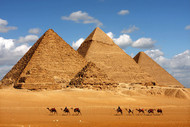Beer, the driving force of human history?
Posted by Isabelle Bellet on 4th May 2019
According to some anthropologists and historians, the attraction of beer is at the root of many innovations that have emerged in the course of human history.
Here are 10 examples over time.
1) Beer triggered the agricultural revolution.
Beer was invented about 3000 years before bread. Barley grains left in a jar in which rain had fallen germinated, then a second rain triggered the fermentation process, producing a liquid that, once ingested, caused an exhilarating sensation. It was to produce more that Neolithic humans began to cultivate grain, moving from nomadic to sedentary at the same time. Beer therefore triggered the Neolithic revolution during which hunter-gatherers began to organize themselves into communities focused on cereal farming.
2) Pottery was invented by Man to contain his beer
Fragments of pottery more than 5000 years old used for the production of beer by Egyptians have been discovered.
3) Beer contributed to the construction of the pyramids in Egypt
Beer was the national drink in ancient Egypt.
The Egyptians were great beer producers. The workers who built the pyramids were paid in beers.
Building a pyramid needed an exorbitant amount of workers, estimated between 20,000 and 30,000, who labored in the hot Egyptian sun for about 23 years. Cutting, dragging and placing limestone bricks wasn’t easy work, especially when you’re getting them almost 500 feet up. There had to be some motivating force to inspire workers. That force was an estimated 231,414,717 gallons of beer.
“It was a source of nutrition, refreshment and reward for all the hard work,” said Dr. Patrick McGovern, an anthropology professor at the University of Pennsylvania. “It was beer for pay. You would have had a rebellion on your hands if they’d run out. The pyramids might not have been built if there hadn’t been enough beer.” So without beer, the only remaining Wonder of the Ancient World would not be standing today.
4) In the Middle Ages, beer saved millions of human lives
The water in the cities was excessively polluted and non-drinkable. People who drank it became ill because of the bacteria it contained. As a result, beer was the main liquid ingested, as the fermentation process killed the majority of bacteria, making the drink drinkable.
5) Pasteurisation is invented to preserve beer
Louis Pasteur was looking to extend the shelf life of beer. The first applications of his findings were in the beer and wine industry. It was his studies on beer that led him to develop his theory of germs and to establish the microbiology from which we benefit today.
6) Industrial automation was born with beer bottles
When it comes to the assembly line, many people attribute this invention to Henry Ford for the production of automobiles. In fact, it was 10 years earlier, in 1903, that Michael Owens invented a machine that mechanically produced beer bottles
7) Refrigeration and air conditioning were made possible by beer
It was the beer industry that funded the research leading to this major technological development. The brewers were looking for a way to brew the lagers cold even in the summer.
8) Beer was the first antibiotic used by humans.
Beer as antibiotics. This is the treatment the Nubians, enjoyed two thousand years ago. The origin of this discovery was the research of anthropologist George Armelagos (University of Atlanta, Emory) and chemist Mark Nelson. Analyses were carried out on mummies exhumed in 1963 in Sudan. Their bones revealed a strong presence of tetracycline, an antibiotic produced by a bacteria called Streptomyces. According to them, only regular consumption could explain such a presence. Their work quickly identified the origin of this antibiotic. These are the cereal grains used to make beer. These were contaminated with Streptomyces bacteria during the brewing process. By dint of fermenting, it produced a large quantity of tetracycline to kill other bacteria.
"Given the amount of tetracycline found, they had to know what they were doing. They probably didn't know what tetracycline was, but they knew that something made them feel better," says George Armelagos. The Nubians would therefore be the first to have discovered an antibiotic, long before Alexander Flemming and penicillin.
9) The first American colony arrived (on the Mayflower) in Plymouth instead of Virginia (their destination) because there was no more beer on board.
The objective was to reach Virginia, but they had to change their minds along the way... because they ran out of beer! The precious liquid was the main beverage on board because beer was safer than water. The settlers therefore changed their route to reach the shore faster, in a place much further north than Virginia, which was to be named Plymouth. Note that official history tells us that they were lost at sea due to winter storms... Georges Washington and Thomas Jefferson were also beer brewers themselves!
10) Beer as a source of income for the Church and the State
Monks in the many monasteries from the 9th to the 15th century have always produced beer to finance their activities.
During the Industrial Revolution, England financed its army and its conquests around the world with taxes on its local beer. Tax revenues from beer quadrupled between 1750 and 1800.
Beer tax is still in force in many countries, including Switzerland.
In Canada, beer has 3 times more economic impact than wine and spirits combined, thanks to the beer tax, one of the highest in the world.
Beer has motivated human beings to make decisions and directions that have fundamentally changed the course of history.
And it is not over.............

